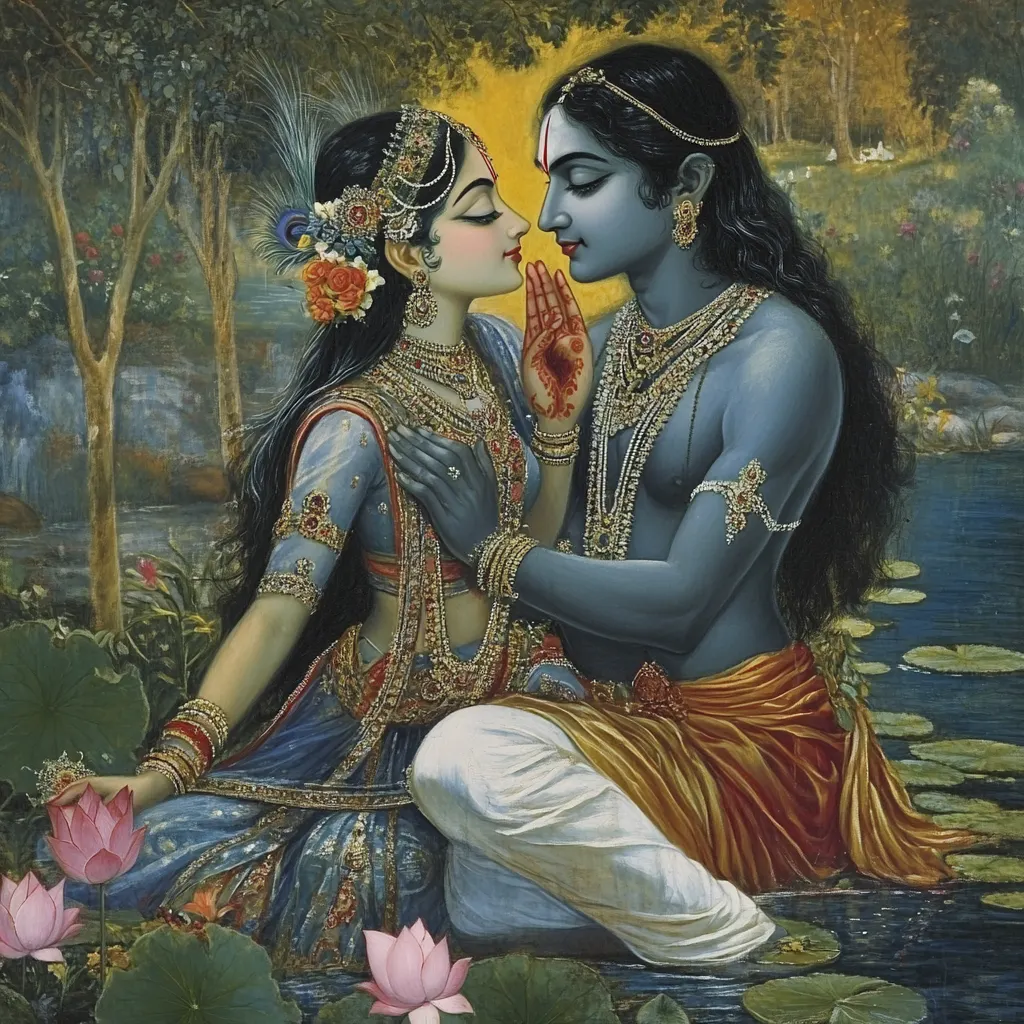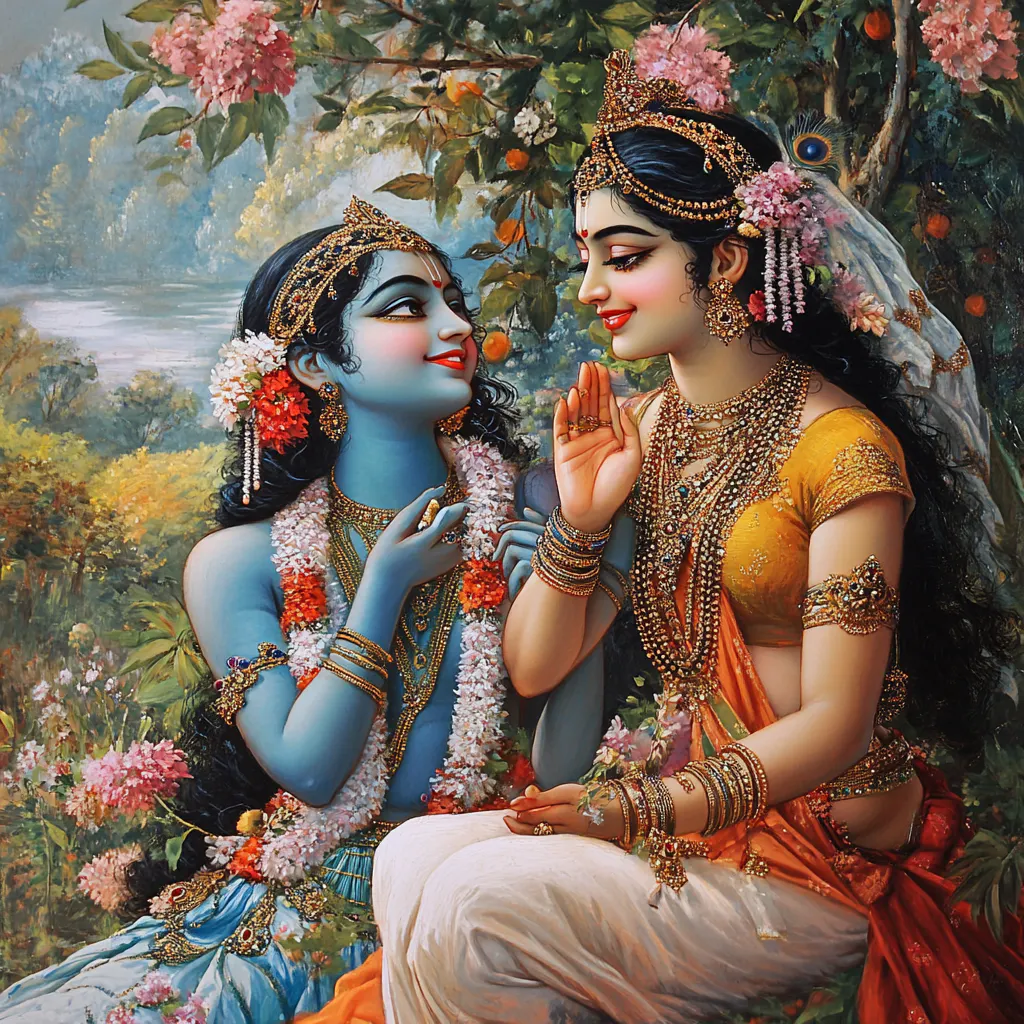Śrī Śrī Nikunja-Vilāsa
An Offering of Rasa-Kathā in Praise of Śrī Rādhā-Mādhava's Secret Sports
(Find explanations how to meditate with the help of this poem below.)

1
In the secluded sanctity of Śrī Vṛndāvana's Nikunja-kuñja,
Śrī Śrī Priya-Priyatam delight in Their confidential rasa-kelī.
Hidden from the eyes of the world, They relish the ambrosial essence of prema-rasa.
From a distance, Śrī Hari-priyā-sakhī, along with Her sakhīs, beholds the scene.
Her heart brimming with joy at the sight of this divine vilāsa.
2
Within that secret bower, Śrī Lāḍilīlāl are immersed in Their eternal play.
The fragrance of mādhurya pervades the air, as laughter dances on Their lips.
They sport tenderly with one another’s lotus-like forms,
And when Śrī Śyāmasundara reveals His masterful kelī-kalā,
Śrīmatī bursts into soft, sweet laughter—
A smile born of deep affection and divine mischief.
3
With gentle fingers, Śyāma touches, presses, and massages
The lotus laden with golden pollen—
From Her breast, nectar flows—
A sacred symptom of premānubhāva.
Though Śrīmatī modestly resists,
Her glance betrays a silent invitation,
And He, intoxicated by Her beauty,
Returns again and again to the game of love.
4
From the thicket’s edge, the nitya-sakhīs gaze in awe.
The rasa-kelī unfolding before them
Is like the rising of a second moon in the forest night.
Their hearts tremble with ānanda,
Their souls drink the divine sight:
The ever-fresh pastimes of Śrī Rādhā-Govinda in the Nikunja.
⬩ Footnotes ⬩
Nikunja (निकुञ्ज) – A secluded forest bower in Vṛndāvana where the most intimate pastimes (kelī) of Rādhā-Kṛṣṇa take place, hidden from all but Their closest companions.
Priya-Priyatam – "The Beloved and Her Lover", denoting Śrī Rādhikā and Śrī Kṛṣṇa as the Divine Couple.
Rasa-kelī – The divine, amorous play infused with transcendental emotional flavor (rasa); not mundane but fully spiritual.
Vilāsa – Graceful, playful movements of the Lord and His consort in love.
Hari-priyā-sakhī – An intimate companion of Rādhārāṇī who serves as witness and helper in Her loving pastimes.
Lāḍilīlāl – An affectionate name combining Śrī Rādhā (Lāḍilī) and Śrī Kṛṣṇa (Lāl).
Divya-kelī – "Divine play", beyond material qualities—pure expressions of spiritual ecstasy.
Kamala – The lotus; often symbolizing the beauty and delicacy of the limbs of the Divine Couple.
Kelī-kalā – The sublime art of loving play, of which Kṛṣṇa is the supreme master.
Premānubhāva – The physical or emotional manifestations of divine love (prema), such as tears, trembling, or in this case, the spontaneous flow of milk.
🪷 jaya jaya śrī rādhā-mādhava yugala-kiśora
🪷 nitya-nikunja-līlā-rasika bhakta-vatsala
Explanations how to meditate
By Ram das
The idea of this poem is that we meditate on the pastimes of Rādhā and Kṛṣṇa.
The highest we can do as human beings is to engage with Goddess and God. A particularly important part of this meditative practice is chanting the holy names because the names of God are completely free of negative energies or meanings. It is the most noble occupation of a human being to chant the names of God. This chanting awakens our true identity as an eternal spiritual soul who is in a loving relationship with Rādhā and Kṛṣṇa.
In addition to remembering (śravaṇam) and chanting (kīrtanam), the third important pillar is meditation on the pastimes of Rādhā-Kṛṣṇa (smaraṇam). These three elements of practice are the first three limbs of nava-aṅga-bhakti, the nine processes of devotional service.

Smaraṇam
The meditation (rūpa-dhyāna, līlā-smaraṇa, līlā-cintana) goes as follows: Imagine in your mind's eye Rādhā and Kṛṣṇa meeting in the kūnja. They haven't seen each other all day (or maybe just a few minutes that seemed like an eternity), and now They are happy to see each other again.
They see each other right now, as if for the first time, standing opposite each other and looking into each other's eyes. See this and feel the wave of ecstasy running through both of Their bodies. They are trembling and sweating, but it is an incredibly ecstatic and blissful feeling. You yourself are a sakhī, a friend of Rādhā or Kṛṣṇa, and witness this scene. You too can feel these feelings.
Śrī Lāḍilīlāl touch each other lovingly, embrace each other, look deeply into each other's eyes and speak to each other in a flirtatious way. You can imagine everything here that you think is part of such an exchange. For example:
Kṛṣṇa approached her slowly, like a bee drawn to the most fragrant lotus. “Priye,” he whispered, “have you brought your nectar again to drive me mad?” Rādhā turned her face, half in jest, half in shyness. “It is you who stirs this nectar with your restless glance.”
Kṛṣṇa begins to touch Rādhā. Rādhā resists playfully, pushing him away, but her smile shows that she likes it.
“Śyāma!” she scolded, breathless, “Your hands are more mischievous than your flute!” “And yet,” Kṛṣṇa murmured, drawing closer, “both know how to please you.” 1
Like this.
Try to imagine it clearly in your mind's eye. When the connection is really established, you will feel ecstatic feelings. Tears will come to your eyes, you may get goose bumps, you will tremble or will experience the others sāttvika bhāvas (Öffnet in neuem Fenster) (also called premānubhāva).
This type of meditation is mighty. It can give you rapid progress in your bhakti. All the mahājanas of the Bhakti-tradition had been doing this, f.i. Śrīla Rūpa Gosvāmī, Śrīla Raghunātha dāsa Gosvāmī, Bhaktivinoda Ṭhākura.
Now it is also relevant what exactly you are meditating on. Here in this example it is the love relationship between Rādhā and Kṛṣṇa. Of course, you can also meditate on other pastimes or relationships. It depends on what your favorite rasa is. If you feel more friendship with Kṛṣṇa, you can meditate on Kṛṣṇa's pastimes with the gopas, the cowherd boys. If you have parental feelings towards Rādhā or Kṛṣṇa, you can meditate on the loving exchanges between Yaśodā and her Lāla, or Kīrtidā-devī with Rādhā.

There are probably different degrees of intensity, although on the other hand it is almost nonsensical to make distinctions in this world of spiritual perfection. As far as mādhurya-rasa is concerned, the erotic rasa between Rādhā and Kṛṣṇa, there is not much talk about it in the tradition because sexuality has very negative connotations in worldly morality and is considered dirty or a disgrace. So we won't talk about it here either, so as not to hurt anyone's feelings. However, you could consider that such an intense encounter, as represented by sexuality and romantic love, is also correspondingly intense in the spiritual world and that meditation on it also has a correspondingly powerful effect. Everyone has to try it out for themselves.
If you do this meditation and gain some experience in it, you will realize that any kind of exchange that Kṛṣṇa or Rādhā have with each other or with their girlfriends and boyfriends is incredibly ecstatic. A look, a touch, a sound of an ankle bell, Kṛṣṇa playing the flute, the smell of Rādhā, walking across a meadow in Vrindavan–anything can become the content of your meditation.
Read the poem again with this explanations in mind. Please try it and feel the bliss. It will not only give you bliss (ānanda) and love (prema), but will make you realize the truth (tattva-jñāna) as well.
© pictures: created with Midjourney
© text: Creative Commons BY-NC-ND (may be used non-commercially with attribution, may not be modified)
This is part of a līlā, that we will publish soon. ↩


